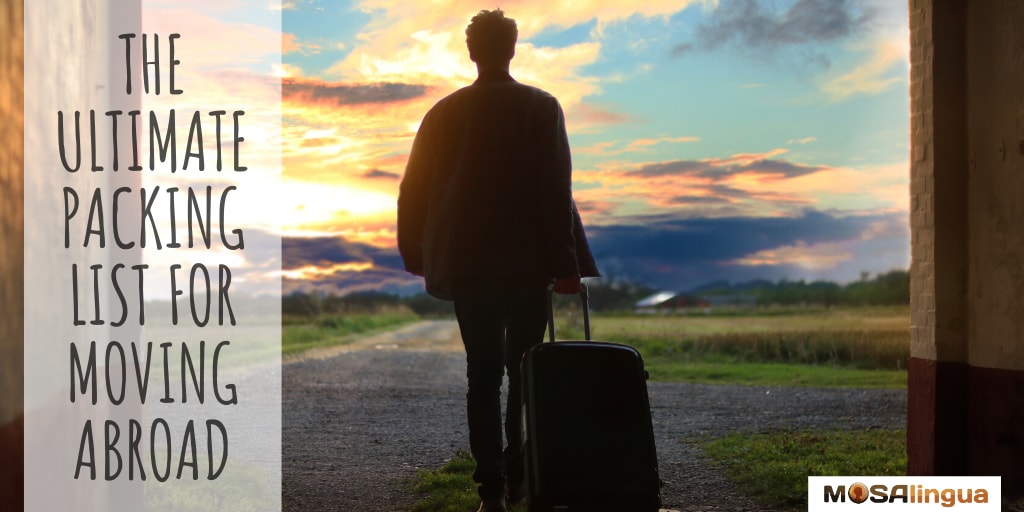So, you’re taking the plunge and are now ready to make the move abroad. After you’ve sorted out your visas, secured a job, figured out how you’re going to learn the language and decided on your digs, it’s time for the boring and stressful task of packing. But don’t get overwhelmed, MyBaggage.com have put together the ultimate packing list for moving abroad to streamline this task and make it as easy as possible. Whether you’re moving abroad for work, studies, or long-term travel, there are certain items that are essential for your packing list.
The Ultimate Packing List For Moving Abroad
Essential documents
It’s important to ensure that you bring all your essential documents with you to your new destination. You will need to prove your identity and that you have the relevant visa to relocate to your new country. Not only should you have the original document, but also a photocopy version just in case. It’s better to be safe than sorry, have separate binders or folders for your original documents and for your copies. That way, if you do lose or end up having your original documents damaged you have the backup copy option secure.
Your essential documents should NOT be placed in your hold luggage, these items always need to be kept in your carry-on bag or on our person. It’s bad enough losing your passport as a tourist, but as something relocating to a new country, it could possibly put your visa in jeopardy.
- Passport
- Visa information
- Travel insurance
- Birth certificate
- Medical records
- Immunization records
- Copies of your boarding passes
- Copies of your accommodation address
- Information regarding your employer/new position
- Bank/credit card information
Medical and first aid supplies
It’s inevitable that when you move to a new country you will get sick at some point. Whereas paracetamol can cost 99p in the UK, it might be a lot more expensive in your new country. It’s best to bring a variety of essential medicine, just in case you might need it and don’t know whether to obtain it or can’t afford to pay such an expensive price for it.
If you have a medical condition and take regular medication, we recommend bringing at least 2 months supply with you to your new country whilst you get set up with a GP. However, please do research as to whether your repeat prescription is available in your new home. Not every country will have the same access to medications, and some will take a different view on tablets we see as harmless. Painkillers such as co-codamol or tramadol are illegal in many Middle Eastern and North African countries and would land you in hot water if you brought them with you.
Depending on where you are moving to there may be an issue with mosquito borne viruses such as malaria or zika. Research this before travel and make sure to bring plenty of deet bug spray to save yourself from getting bitten.
If you are moving to a developing country that is warm, remember to bring full coverage sun cream. This product can often be a luxury so you will end up paying high prices for it or might even find it difficult to find outside of tourist resorts.
- Prescription medication with a note from your GP outlining the medication you are on
- Simple first aid kit
- Medicine for stomach sickness
- Re-hydration sachets
- Plasters
- Paracetamol and ibuprofen
- Mosquito or bug spray
- Bite and sting ointment
- Sun cream
Electronics
You will be lost without your technology, ensure you bring your cell phone, laptop and most importantly chargers and a travel adapter. If you plan on going on long trips or won’t have access to an electrical socket for some time investigate bringing a solar power USB charger with you.
- Cell phone and charger
- Laptop and charger
- Travel adapters
- Camera
- External hard drive
- Headphones
- Torch
- Solar power USB charger
Clothes
The clothes you decide to bring will depend on the climate of your new home. Research this thoroughly and don’t forget that the Southern Hemisphere is warm for Christmas and chilly in July.
If you are moving to a country with multiple seasons and you need to pack for every eventuality, then it’s important to bring layers. A good tip is to also research the country you are moving to. Do they have any clothing restrictions or religious customs? You don’t have to worry about packing too much as ultimately you will be able to get clothes when you arrive.
- 1 x comfortable shoes
- 1 x waterproof boots
- 7 x socks
- 7 x underwear
- 5 x bras
- 2-4 x lightweight tops with varied sleeve length
- 1 x sweater or jumper
- 1 x waterproof jacket
- Winter essentials if needed such as thermals or vests etc.
- 1 x warm winter coat
- 1 x lightweight jacket
- 3 x dresses (which can be dressed up or down or worn with leggings underneath in a conservative country)
- 3 x bottoms including two pairs of trousers and one skirt
- 1 x swimsuit
- 1 x towel (and 1 x hair wrap towel if you have long hair)
- Sunglasses
- 1 x scarf (this could be to use as a head covering or for winter)
- 1 x hat
- 2 x outfits to hit the town
- 1 x pyjamas
Toiletries
It’s best to bring all your home comfort toiletries with you as you never know what might be available when you move to your new home. Also, some items such as razors might be more expensive than they are at home so it’s a good idea to save some money.
Feminine hygiene products differ around the world, with tampons being inaccessible in some countries. It’s also good to note that some countries also only offer scented sanitary pads. If you are sensitive or have a favourite brand, stock up. You could also investigate bringing a reusable alternative such as period pants or a menstrual cup.
- Toothbrush
- Toothpaste and dental floss
- Deodorant
- Shower gel
- Solid soap bar
- Shampoo & conditioner
- Razor with shaving foam or waxing strips
- Lip balm
- Nail clippers and nail file
- Tweezers
- Feminine hygiene products
- Condoms
- Contact lenses and solution (if applicable)
Other items you might need
You never know what item you might need and not be able to find. From ear plugs to drown out the nose of the busy city streets to a pollution mask to help you adjust to the smog in Beijing. These just in case items can make all the difference:
- Sewing kit
- Ear plugs
- Eye mask
- Pollution mask
- Duct tape
- Money belt
- Filtered water bottle
- Treats from home
- Diary
- Sudocream – ideal for sunburn, bug bites, cuts, scrapes and allergic skin reactions.
Tips To Round Out Your List Before Packing Up and Moving Abroad
There you have it – the ultimate packing list for moving abroad. Of course, there are also other personal items which, if they are important to you, should be high on your list – such as photos or albums of family and friends, or childhood toys. These sentimental items can help you feel more at home in the new country you are moving to and ease any homesickness you may experience.
It’s also worth noting that you should really try your best to pack as early as possible, as daunting a task it may be. It’s often far too easy to leave packing until the last minute, but this can cause undue stress during an already stressful time. It is much better to pack several weeks in advance, to ensure you have given yourself enough time to pack without rushing – and enough time to realise if you have forgotten anything! Then, when moving day finally rolls around, you can rest assured knowing that everything you need is packed, allowing yourself more time to enjoy one of the most exciting journeys of your life.
Written by Stuart Cooke, blog writer at MyBaggage.com, a luggage delivery service that helps travellers take the hassle out of travelling.
Related posts:
Want to start improving your language skills today?
Start learning a new language today

Good news: we can help!
More good news: you can get started for free! Start your free trial now and for the next 15 days, take advantage of the most effective language learning method on the market!
Vocabulary flashcards, videos with subtitles, audiobooks, articles adapted to your level – with MosaLingua Premium (Web & Mobile), you’ll have access to all this and more. Get started right now. It’s free—and risk-free—to try!






Comments